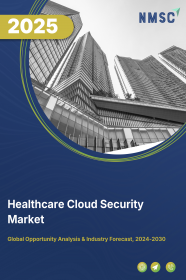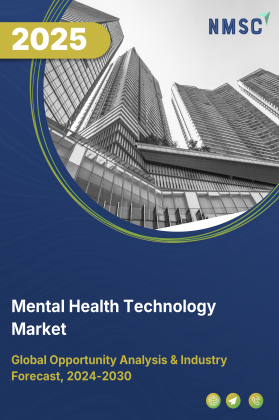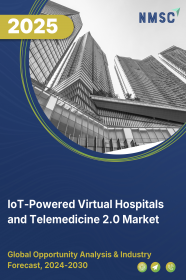
Healthcare Cloud Security Market by Deployment Model (Public Cloud, Private Cloud, and Hybrid Cloud), by Security Service Type (Identity and Access Management (IAM), Data Encryption, Threat Detection and Prevention, Data Loss Prevention (DLP), and Compliance Management), by Component (Solutions and Services), by Size (Small and Medium-sized Enterprises (SMEs) and Large Enterprises and Others) – Global Opportunity Analysis and Industry Forecast 2024-2030
Healthcare Cloud Security Market Overview
The global Healthcare Cloud Security Market size was valued at USD 10.30 billion in 2023 and is predicted to reach USD 27.40 billion by 2030 with a CAGR of 15.0% from 2024-2030. Healthcare cloud security (HCS) market refers to the set of protocols, technologies, and practices designed to protect sensitive patient data and healthcare infrastructure in cloud computing environments. It addresses the unique challenges of securing electronic health records (EHRs), telemedicine platforms, and other cloud-based healthcare services. This includes ensuring data confidentiality, integrity, and availability while complying with regulations such as health insurance portability and accountability act (HIPAA) and general data protection regulation (GDPR). By implementing robust security measures such as encryption and access controls, healthcare cloud security mitigates risks of data breaches and cyberattacks that enables secure and efficient healthcare delivery.
Market Dynamics and Trends
The healthcare cloud security sector is witnessing a substantial increase in cyberattacks and data breaches, with sensitive patient information becoming a prime target. This escalating threat landscape drives the urgent need for robust cloud security measures to protect healthcare data from unauthorized access, ransomware, phishing, malware infections, and other malicious activities such as data theft and system intrusions. For example, Cybersecurity Ventures projected that global cybercrime costs will increase by 15% annually surging to USD 10.5 trillion annually by 2025 as compared to USD 3 trillion in 2015.
Also, innovations such as advanced encryption, artificial intelligence (AI) driven threat detection, and identity management enhances cloud security effectiveness while enabling healthcare organizations to implement proactive measures to safeguard patient data in the cloud. As per McKinsey, AI help to protect digital health infrastructure from security threats. AI's advanced capabilities offer a robust defense that can potentially save the industry from projected financial losses of up to USD 10.5 trillion by 2025.
Moreover, the growing collaborations between cloud providers and healthcare organizations are developing specialized security solutions that address regulatory compliance, data protection, and threat mitigation in the healthcare industry, thus driving the demand for HCS industry. For instance, in September 2023, Mayo Clinic adopted Microsoft 365 Copilot, a generative AI service merging large language models with Microsoft 365 data to boost productivity. Its focuses easing administrative tasks for healthcare providers, allowing more time for patient care.
However, the high upfront costs associated with the healthcare cybersecurity sector is hindering the healthcare cloud security market growth. On the contrary, the integration of AI in healthcare cloud security is projected to create future opportunities as it enhances healthcare services by enabling predictive analytics for identifying at-risk patients focusing upon improving the health outcomes. For instance, in October 2023, Microsoft launched AI solutions to help healthcare organizations unlock insights and improve patient and clinician experiences. As AI in healthcare boosts cloud security in protection, threat detection, compliance, and access management.
Market Segmentations and Scope of the Study
The healthcare cloud security market report is divided on the basis of deployment model, security service type, component, size, application, end user and region. Based on deployment model, the market is divided into public cloud, private cloud, and hybrid cloud. On the basis of security service type, the market is divided into identity and access management (IAM), data encryption, threat detection and prevention, data loss prevention (DLP), and compliance management. Based on component, the market is divided into solutions and services. The services sector is again divided into consulting, managed security services and training and education. On the basis of size, the market is divided into small and medium-sized enterprises (SMEs), and large enterprises. On the basis of application, the market is divided into electronic health records (EHR) security, health information exchange (HIE) security, telemedicine security, medical imaging and diagnostics security, healthcare internet of things (IoT) security, and others. On the basis of end user, the market is divided into healthcare providers, healthcare payers, pharmaceutical companies, medical device manufacturers, research institutions, and others. Regional breakdown and analysis of each of the aforesaid segments includes regions comprising of North America, Europe, Asia-Pacific, and RoW.
Geographical Analysis
North America dominates the healthcare cloud security market share at present and is projected to continue its dominance throughout the forecast period. This is due to factors such as the growth of a well-established healthcare sector in countries across the North American region, including the U.S. and Canada. As per McKinsey report 2024, the U.S. healthcare profit is projected to grow at a 7% CAGR, from USD 583 billion in 2022 to USD 819 billion in 2027. The growth of U.S. healthcare is expected to create demand for cybersecurity to protect increasing volumes of sensitive data and new digital health technologies.
Moreover, the dominant companies of healthcare cloud security sector such as McAfee, Cisco Systems, and Microsoft are based in the North America region and further it’s driving the expansion of the market. For instance, Microsoft collaborated with Epic to accelerate generative AI’s impact in healthcare, addressing the industry’s most pressing needs such as enhance patient care, increase operational efficiency, improve healthcare experiences, and support the financial integrity of health systems globally.
On the other hand, Asia-Pacific is considered fastest growing region in healthcare cloud security industry. This is owing to the factors such as increasing threat of cybersecurity across healthcare sector. As per Sophos November 2023, nearly 60% of healthcare organizations globally have suffered a cyberattack in the past 12 months this includes India’s top institutions such as the All-India Institute of Medical Sciences (AIIMS) and the Indian Council of Medical Research (ICMR).
Moreover, the governments across the Asia-Pacific region are implementing various healthcare reforms and initiatives to improve healthcare access, quality, and affordability. As per the Government of India, the hospital sector in India is expected to reach USD 219.77 billion by FY 2027, growing at a CAGR of 18.24%. This projected growth is creating ample demand in healthcare cloud security industry.
Competitive Landscape
Various key players in the healthcare cloud security industry includes Athenahealth, CareCloud, Inc., Carestream Health, Dell Inc., IBM Corp., McAfee, LLC., Trend Micro Incorporated., Akamai Technologies, Fortra, LLC, CA Technologies, and others. These market players are opting various strategies such as product launch and collaboration to maintain their dominance in the global market.
For instance, in April 2023, Athenahealth launched new patient engagement tool that aims to help healthcare providers to measure and improve patient interactions, fostering a more digital, technology-enabled experience for better care.
Moreover, in October 2023, CareCloud, Inc. launched the CirrusAI and it aims to serve as a digital healthcare assistant, helping to enhance clinical decision-making, streamline workflows, reduce administrative burdens, optimize revenue management, and promote patient-centered care.
Additionally, in March 2023, Cleveland Clinic partnered with IBM launched the first quantum computer dedicated to healthcare research and it aims to find new treatments for patients with diseases such as cancer, alzheimer and diabetes.
Key Benefits
-
The report provides quantitative analysis and estimations of the healthcare cloud security market from 2024 to 2030, which assists in identifying the prevailing market opportunities.
-
The study comprises a deep-dive analysis of the current and future healthcare cloud security market trends to depict prevalent investment pockets in the market.
-
Information related to key drivers, restraints, and opportunities and their impact on the healthcare cloud security market is provided in the report.
-
Competitive analysis of the players, along with their market share is provided in the report.
-
SWOT analysis and Porters Five Forces model is elaborated in the study.
-
Value chain analysis in the market study provides a clear picture of roles of stakeholders
Healthcare Cloud Security Market Key Segments
By Deployment Model
-
Public cloud
-
Private cloud
-
Hybrid cloud
By Security Service Type
-
Identity and Access Management (IAM)
-
Data Encryption
-
Threat Detection and Prevention
-
Data Loss Prevention (DLP)
-
Compliance Management
By Component
-
Solutions
-
Services
-
Consulting
-
Managed security services
-
Training and education
-
By Size
-
Small and Medium-sized Enterprises (SMEs)
-
Large Enterprises
By Application
-
Electronic Health Records (EHR) Security
-
Health Information Exchange (HIE) Security
-
Telemedicine Security
-
Medical Imaging and Diagnostics Security
-
Healthcare Internet of Things (IoT) Security
By End User
-
Healthcare providers
-
Healthcare payers
-
Pharmaceutical companies
-
Medical device manufacturers
-
Research institutions
-
Others
By Region
-
North America
-
The U.S.
-
Canada
-
Mexico
-
-
Europe
-
The UK
-
Germany
-
France
-
Italy
-
Spain
-
Denmark
-
Netherlands
-
Finland
-
Sweden
-
Norway
-
Russia
-
Rest of Europe
-
-
Asia-Pacific
-
China
-
Japan
-
India
-
South Korea
-
Australia
-
Indonesia
-
Singapore
-
Taiwan
-
Thailand
-
Rest of Asia-Pacific
-
-
RoW
-
Latin America
-
Middle East
-
Africa
-
REPORT SCOPE AND SEGMENTATION:
|
Parameters |
Details |
|
Market Size in 2023 |
USD 10.30 Billion |
|
Revenue Forecast in 2030 |
USD 27.40 Billion |
|
Growth Rate |
CAGR of 15.0% from 2024 to 2030 |
|
Analysis Period |
2023–2030 |
|
Base Year Considered |
2023 |
|
Forecast Period |
2024–2030 |
|
Market Size Estimation |
Billion (USD) |
|
Growth Factors |
|
|
Countries Covered |
28 |
|
Companies Profiled |
10 |
|
Market Share |
Available for 10 companies |
|
Customization Scope |
Free customization (equivalent to up to 80 working hours of analysts) after purchase. Addition or alteration to country, regional, and segment scope. |
|
Pricing and Purchase Options |
Avail customized purchase options to meet your exact research needs. |
KEY PLAYERS
-
Athenahealth
-
CareCloud, Inc.
-
Carestream Health
-
Dell Inc.
-
IBM Corp.
-
McAfee, LLC.
-
Trend Micro Incorporated.
-
Akamai Technologies
-
Fortra, LLC
-
CA Technologies




















 Speak to Our Analyst
Speak to Our Analyst

























